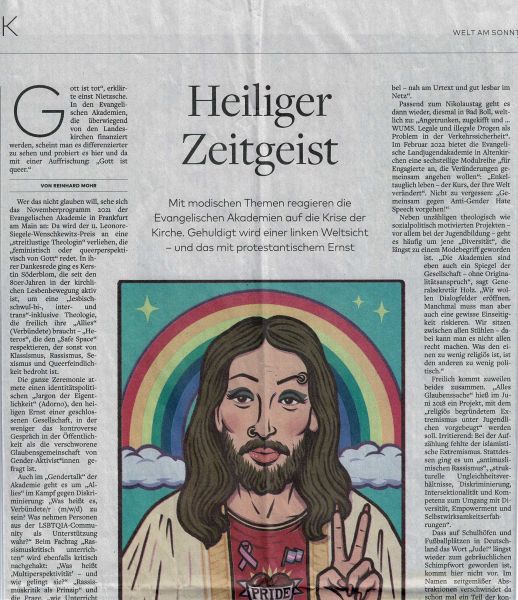Newspapers in Germany1: Holy Trendiness
The next several posts concern newspaper articles that I gleaned from my daily take of newspapers while I stayed in Erfurt. Sadly hotels and restaurants do not stock newspapers as often as they used to. The first article appeared in the Sunday edition of Die Welt on December 5. "Heiliger Zeitgeist" plays on the word Heiliger Geist, German for "Holy Spirit." In English, Heiliger Zeitgeist means "Holy Trendiness." The article says that Lutheran Church officials, faced with declining attendance and defections, decided they had to do something to bring in more people.
In Germany, Roman Catholicism and Lutheranism are State Churches, government agencies that depend on the Church Tax that every German citizen pays; so the need to justify the government's expenditures remains a constant. Americans should remind themselves of the difference. In the US, anyone can start a church and write up a charter to define its beliefs and intentions. In Germany, the government owns the properties and makes the decisions. In the US, you do everything yourself. The government mandates organizational and bookkeeping minimums, but the individual church owns whatever property it accumulates.
Lutheran Church officials decided to combat lagging church attendance by promoting Christianity in a new light, giving it a freshening up, in German an "Auffrischung". As a result, the Evangelical Lutheran Church in Germany awarded an important prize to the Lutheran pastor Kerstin Söderblom. Söderblom has proven herself a combative personality, in German "streitlustig". She approaches the Christian faith with an agenda she calls "feministisch oder Queer-perspektiven". Surely, that doesn't need translating.
Sociologists use the term "imaginary" to describe our organized ideals, how we would like society to function, as well as the goals of the society; but messing with the Kingdom of Heaven is another matter. The terms of the Christian faith have been around for 2000 years. It's someone else's turf, in other words, defined eons ago. You either accept it or reject it.
Why mess with the terms of the Christian Kingdom, at all? The Communist governments understood this better than the New Left. Just step away from Christianity altogether. Write your own scripture and create your own religion. Everyone knows that the Bible defines the Christian faith. It defines the terms of life for believers and non-believers alike. Instead of trying to imagine your way into the Kingdom of Heaven, leave the Kingdom, and be on your way.
Pastor Söderblom's "God" only occupies a space in her personality. It's her trip, in other words, not something outside of herself, not something immutable, separate, and alive. Her crazy ideas about turning the Kingdom of Heaven into a gay-feminist Queendom—inclusive and tolerant—sound like grasping at straws.
Why stop at God? Why not also make people and institutions creatures of your mind? Make people in your own image. If you imagine people in your own image, you don't have to worry about them not agreeing with you.
The "Heiliger Zeitgeist" article convinces me that the political Left takes a solipsistic approach to its fellow men. Anything you do to people, you do it for their own good. People of Söderblom's ilk do not see God or people as independently functioning entities who exist in an objective reality.
If God's maleness, if His preference for male subordinates and male-oriented terms do not appeal to Feminists or homosexuals, why bother with inclusiveness. You're not only deceiving yourself, you also admit that Christianity still provides your center of gravity, no matter how combative you are. The moral core of Christianity still has a hold on you.
If you want the godhead to be inclusive—even if inclusivity just means lacking enough substance or definition to rankle someone, then search the Internet for another ancient deity, like the female deity Gaea—Γαῖα in Ancient Greek.
My concept of God has more substance than theirs, and I'm not even a Christian. If anything, I curse God for the trouble I've seen in my lifetime. If God has substance, he is responsible. I curse Him for allowing the suffering and relentless undermining of old friends—shaming and ruining people with sheep-like faith. John le Carré would call them "the meek who do not inherit the earth." I hate God for appearing to prefer evil to goodness, allowing the losers to descend into despondency and loss of faith—those among many other reasons.
I just say "F___ His ass to Hell!" But I don't go along with the idea that, if you don't like God as He presents Himself in text written eons ago, with defined character-traits and intentions, you fantasize your way out of the quagmire of established definition, and turn god into a cosy, malleable cypher.
The basic dicklessness of German Lutherans--more bureaucratic than religious--doesn't work for me, no matter how combative Söderblom may appear on the surface.

